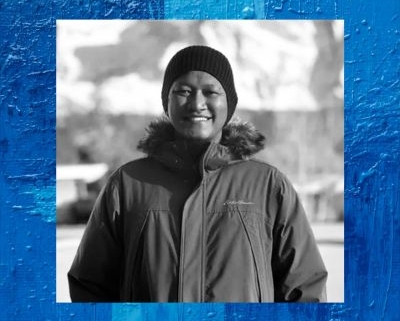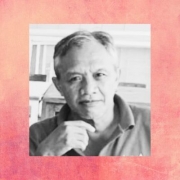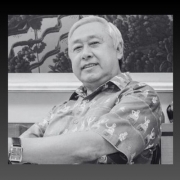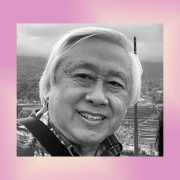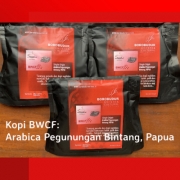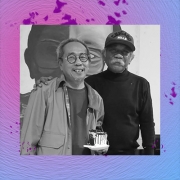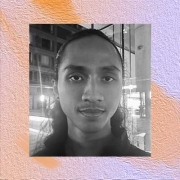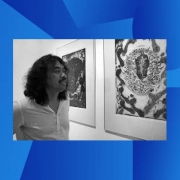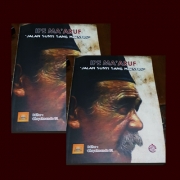Curatorial Essay: “Panca Wasta” by Aries BM – Learning from Pacul: Which Ways of Internationalism We Aim For?
By: Brian Trinanda K. Adi*
From 21 June to 31 August 2025, the Yogyakarta International Creative Arts Festival (YICAF) returned for its third edition at ISI Yogyakarta. This festival aspires to serve as a space for collaboration and dialogue among artists of diverse backgrounds, while simultaneously reinforcing ISI Yogyakarta’s position as an institution of international standing. Judging by the participation of artists from eleven countries—including Australia, Singapore, Malaysia, Thailand, Vietnam, South Korea, China, the United Kingdom, Hungary, Japan, and Austria—supported by initiatives such as Project 11 Australia, the festival appears to have achieved this goal. Yet, one must ask: does simply hosting participants from multiple countries automatically render a festival, or a campus, “international”?
I approach the concept of internationalism differently. Internationalism cannot be reduced to the mere presence of foreign participants in an exhibition. It is not enough to be international just by importing international names or juxtapose local works with those from abroad. Such gestures, if unexamined, even risk perpetuating a subtle inferiority complex, as if local works are only legitimised through their proximity to foreign art. True internationalism, in my view, lies in the parity of subjectivities—an equality of vision, process, and representation. Local works deserve to be recognized in their full integrity: from the conceptual germination and material exploration to the final presentation, they must stand on equal footing with works from any other part of the world.

It is within this framework that Aries BM’s “Panca Wasta” commands attention. A work deeply rooted in local craft traditions—kriya, this work emerges from the rich legacy of Javanese tradition. Aries demonstrates mastery over ceramics, metal, and wood—materials that in the context of kriya as a discipline are not considered as mere material, yet substances carrying elemental and philosophical meanings. To be truly international is to honour the wholeness of Aries’s artistic journey—his personhood, his process, and his works—alongside, or even above, the contributions of foreign artists in this “international” exhibition.
At the core of “Panca Wasta” lies the pacul or cangkul, the humble Javanese hoe, an everyday tool once ubiquitous in rural life. At first glance, the pacul may seem antiquated, overshadowed by the sleek efficiency of mechanised agriculture, where tractors and cultivators allow a single farmer to manage hectares of land without ever soiling their hands. In this comparison, the pacul could easily be dismissed as a primitive relic. But that dismissal, I argue, reflects a narrow view of modernity—one that equates progress solely with Western technological prowess. This is the very stance that undermines a genuine internationalist perspective, masking cultural insecurity, inferiority, behind the rhetoric of “technological advancement.”
Pacul’s significance becomes clearer when considered through the lens of sustainability. Contemporary movements such as permaculture—pioneered by Bill Mollison—emphasise ecological harmony and minimal soil disruption. In fact, the manual techniques embedded in Nusantara’s agrarian heritage inherently embody these principles of permaculture. Yet we now find ourselves must travel across the globe to learn these practices, which is through Bill Mollison, about a very practice that our ancestors once intuitively mastered. We, ironically, have abandoned tools like pacul and, at simultaneously, the environmental wisdom they carry.
Herein lies a critical reflection on what I call the failure of cultural porosity. Postcolonial universities, as primary sites of cultural production and reproduction, often perpetuate colonial legacies unconsciously. Western epistemologies dominate curricula, local knowledge is dismissed as unscientific, and the very architecture, rituals, and hierarchies of our institutions bear the imprint of 19th-century European models. Global rankings and accreditation systems reinforce this coloniality, compelling Southern universities to conform to Western paradigms while sidelining local needs. Internationalism, in such a context, risks becoming an empty performance rather than a meaningful exchange.
Against this backdrop, “Panca Wasta” functions as a decolonial gesture. By elevating pacul into a spiritual artefact, Aries restores a connection between human labour, the earth, and inner life. The work carries five carved emblems—bird, woman, house, kris or keris (Javanese traditional dagger), and horse—embodying Javanese ideals of responsibility, balance, courage, knowledge, and devotion. Together, they articulate a vision of the ideal human, one aligned with ethical labour and harmonious existence.
“Panca Wasta” also reimagines masculinity on a global stage. Rather than perpetuating dominance, Aries presents a figure that is both gentle and resilient—a man who derives strength from compassion and equilibrium. This notion of spiritual masculinity challenges contemporary narratives that often pit masculinity against feminist values. In doing so, the work situates Indonesian craft within a global philosophical conversation, not as a subordinate voice but as an equal contributor.
By treating wood, metal, and ceramic not as mere materials but as a philosophical language, Aries transforms craft from “handicraft” into a paradigm—a way of knowing the world through tactile engagement and ecological consciousness. “Panca Wasta” emerges as a critique of capitalism’s mechanisation of labour and a reminder that work, at its most ethical, is not merely productive but life-giving.
Ultimately, this work speaks to a universal truth: technology devoid of wisdom is directionless, as genuine progress is rooted in soil tilled with care. In this light, Aries BM, through his pacul, calls upon Indonesia and its art institutions as agents of cultural porosity to embody a form of internationalism that is not performative but principled—rooted in justice, dignity, and the courage to honour our own cultural knowledge.
—-
*Brian Trinanda K Adi, born in Pati, Central Java, is an ethnomusicologist and cultural researcher/activist. He holds an Ethnomusicology degree from the Indonesian Institute of the Arts, Yogyakarta, and a master from Gadjah Mada University’s Center for Religious and Cross-Cultural Studies. In 2019, he earned a diploma in Advanced Inter-religious Studies from the Ecumenical Institute at Chateau de Bossey, Switzerland. Since 2022, he has been a PhD candidate at the University of Amsterdam (UvA), Amsterdam School for Cultural Analysis (ASCA). Brian is also the founder of several music and/or culture festivals and serves as Chair of Festival Muria Raya and Lesbumi PCINU Netherlands.


